- 2 hours ago
- Business
-
(비지니스) 잭 마는 중국버전 복합언론재벌 루퍼트 머독인가?아름다운 인생/비지니스 2016. 5. 5. 12:23
출처: http://www.bbc.com/news/business-36082026
Is China's media tycoon Jack Ma the new Rupert Murdoch? (tycoon: 거물)
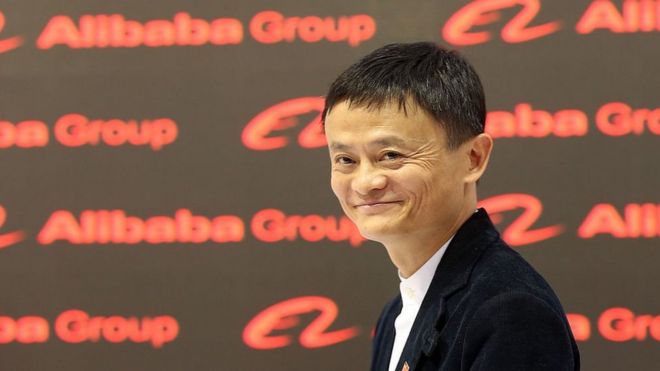 Getty Images
Getty ImagesJack Ma: an online and media tycoon on the move China's media landscape is changing at an unprecedented pace, thanks in part to dynamic figure of Jack Ma, one of the country's most prominent e-commerce tycoons and founder of the Chinese online retailer Alibaba. (retailer: 소매상, 소매업)
China's propaganda boss Liu Qibao extolled Mr Ma as one of the archetypal individuals seen as "shining calling cards for the image of contemporary China" in a press conference last year. (extol: 칭찬하다) (calling card: 명함, 전화카드)
In December, Jack Ma made the headlines after paying $266m for Hong Kong's oldest English-language newspaper The South China Morning Post.
He is also now reportedly seeking to purchase an undisclosed stake in one of China's most-respected business magazines, Caixin - it is part of a rapidly growing media empire that has caused him to be dubbed by some, China's Rupert Murdoch. (undisclosed; 비밀에 붙혀진, 밝혀지지 않은) (stake: 지분) ( be dubbed: ~라고 불리다)
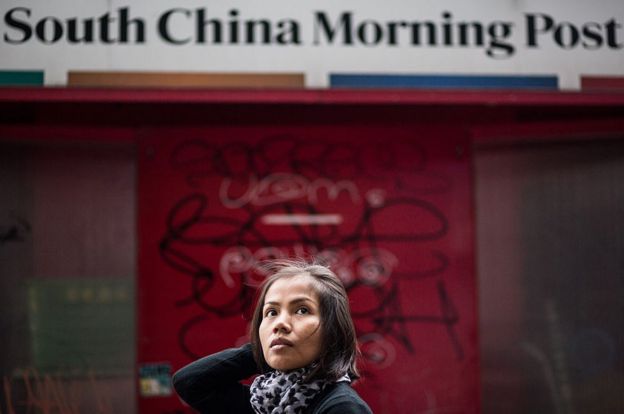 Getty Images
Getty ImagesAlibaba has said it will maintain the South China Morning Post's objectivity in the face of fears it will lose its independent voice Growing empire
And these are not the only media deals Mr Ma has been making in recent years.
Since 2013, the Chinese billionaire has acquired major or minor stakes in newspapers and online platforms, including Business Review, China Business Network and most notably China's largest video-sharing site, Youku Tudou. 2013년 부터 잭 마가 신문이나 온라인 플랫폼의 크고 작은 지분들을 확보
He has also invested in social media products like Momo, one of China's most popular dating apps, and Sina Weibo, the country's largest social media outlet. 잭 마는 사회관계망 매체에도 투자
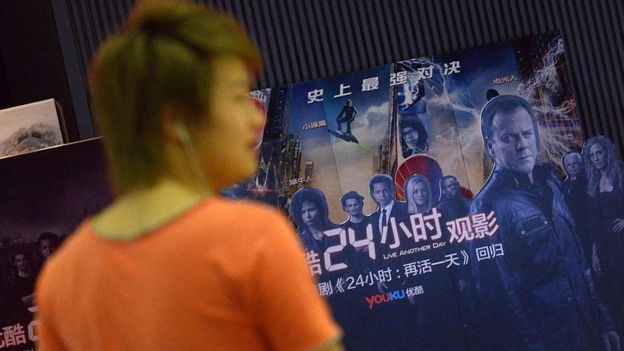 Getty Images
Getty ImagesJack Ma has invested significantly in Youku Tudou, the country's equivalent of YouTube In 2014 he bought up ChinaVision Media (since renamed Alibaba Pictures) and last year spent $382m to become the second-largest shareholder in Beijing Enlight Media - the maker of hit movies such as Lost in Thailand.
He is also reaching beyond China's borders. Last year he ploughed $200m into Snapchat, one of the most popular social apps among millennials and another $215m into messaging app Tango.
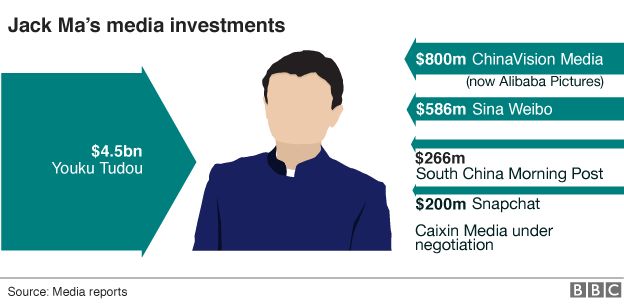
China's Rupert Murdoch?
So how realistic is this comparison made by some Chinese commentators with the US media mogul Rupert Murdoch, whose empire spans Britain's Sun Newspaper to New York's Wall Street Journal? (mogul: 거물, 실력자)
Those close to Jack Ma's decision-making say that things are more nuanced than this.
"He has increasing investments in media, but I wouldn't go so far as to call him a media tycoon yet," says Duncan Clark, author of Alibaba: The House that Jack Ma Built.
"He's trying to expand Alibaba's offering from just e-commerce into the higher value areas, which middle-class Chinese will spend more on in [the] future," says Mr Clark, who has known Jack Ma since he founded Alibaba in the 1990s.
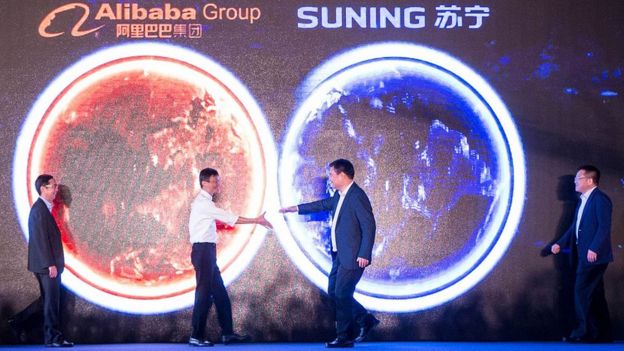 Getty Images
Getty ImagesIt's not just media firms Alibaba is buying. Last August it bought a $4.5bn stake in the consumer electronics retailer Suning Ge Jia, an influential Beijing-based tech blogger agrees with this, saying the differences between the two men are significant.
"After all, Murdoch operates in a free media environment that allows him to do everything that makes business sense to him," he tells the BBC, "but China's media environment is different to say the least."
Balancing act
In November 2014, Mr Ma summarised his business strategy as "two Hs": healthcare and happiness, that in his view are the two biggest problems China will be facing in the next 10 years.
The former refers to his entry into pharmaceutical and health-related businesses, the latter to Alibaba's increasing investments in entertainment products such as US Paramount Pictures movie, Mission: Impossible - Rogue Nation.
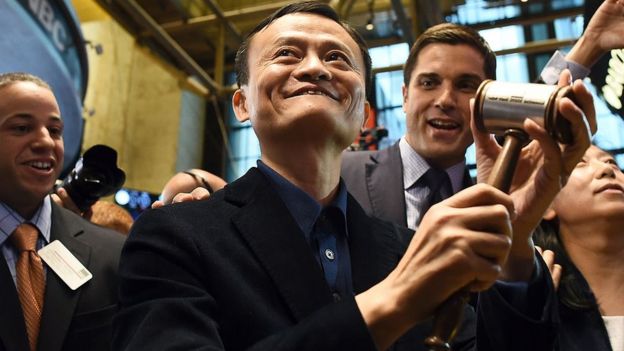 Getty Images
Getty ImagesAlibaba now has a listing on the New York stock market Jack Ma's purchase of The South China Morning Post does show that "he wants to play a role in boosting the prominence and voice of China in the world," says Duncan Clark, but his foray into the media world is not just about politics. (foray: 시도, 진출, 습격)
For Jack Ma, areas such as the media - which have long been dominated by the state and state-owned-enterprises - can help him diversify and access higher margin businesses than selling products online, says Mr Clark.
But the process is more like a balancing act, he says: "They have to dance to government's tune to some extent - helping the government do its job - but not be distracted from listening to customers and serving them well."
This is not an easy task, and involves weighing "the increasingly conservative regulation of the media, against the increasingly liberal tastes and interests of younger people," says Mr Clark.
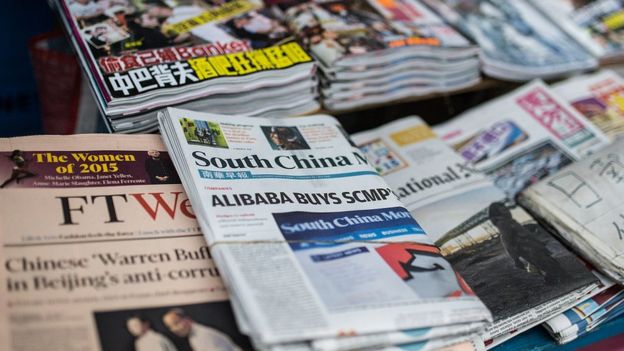 Getty Images
Getty ImagesJack Ma's purchase of The South China Morning Post shows he wants to play a role in boosting China's voice in the world, says Duncan Clark Potential deal
Some say that in order to achieve his ambitions, Mr Ma has to temper some of the vocal critics of his business practices. one of them is Caixin, whose journalism has long been described as the Chinese equivalent of The Economist.
In March, news broke that Mr Ma's Ant Financial was in talks to purchase a stake at Caixin Media, whose 2011 investigation revealed that Mr Ma transferred Alipay to a firm controlled by him without securing approval from its principal shareholders, Yahoo and Japan's SoftBank Group. (shareholders: 주주들)
Caixin has confirmed that it is close to completing a round of funding with "several potential new investors" without naming them. It has said it always welcomes "high quality" investors.
Two people close to the deal have told the BBC that it is "still under way".
If the deal is successful Mr Clark says it would be 'a coup' for Jack Ma. "There aren't frankly that many quality domestic media properties [like Caixin]," he says.
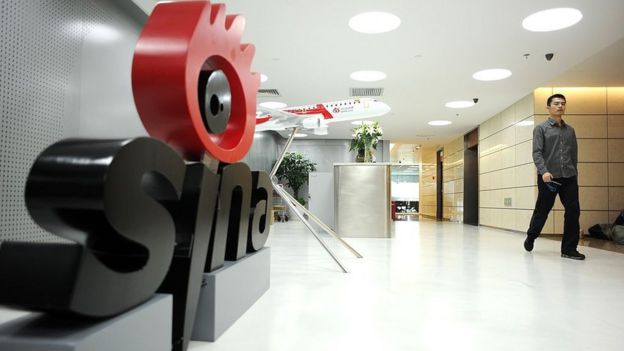 Getty Images
Getty ImagesSina Weibo, Chinas's largest social media outlet, is just one of the businesses in which Jack Ma has invested But tech blogger Ge Jia, who was taken to the court by Alibaba for his critical comments online in 2014, disagrees.
"To me, it's more of a collaboration than a coup," he tells the BBC.
"Mr Ma needs Caixin's connections and influence; and Caixin needs his money as the business has always been not very profitable."
Mr Ge says while he doesn't think any Caixin deal would make it a foot soldier of Jack Ma - it might still make the business magazine tone down its criticism of Alibaba and Jack Ma's various business practices.
In response to such concerns, Caixin said last month that potential investors would "respect Caixin's editorial independence as our past stakeholders have done, and accept our internal firewall and compliance management arrangements, which will safeguard our credibility".
'아름다운 인생 > 비지니스' 카테고리의 다른 글
(비지니스) 美온라인운송업체 우베르社 무인자동차 기술개발에 뛰어들다 (0) 2016.05.21 (비지니스) 태양을 향해 운동하고 있는 수성 (0) 2016.05.10 (비지니스) 버리는 문화에 대항한 고쳐쓰는 비지니스 (0) 2016.05.04 (비지니스) 탈세를 제동걸고자 시행하는 것에는 무엇이 있는가? (0) 2016.04.13 (비지니스) 왜 파나마는 세계 10대 조세피난처에 해당 안 되나? (0) 2016.04.11